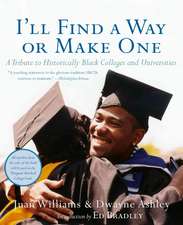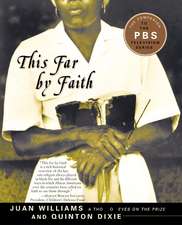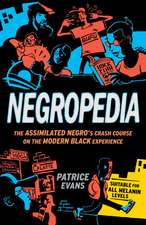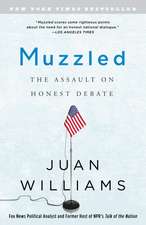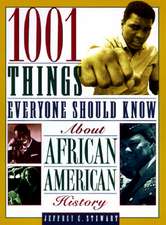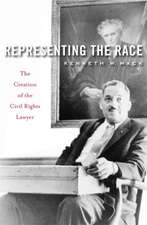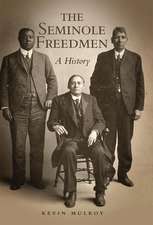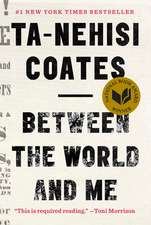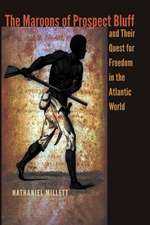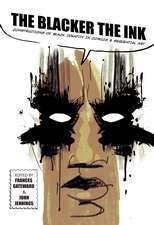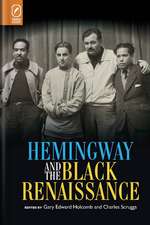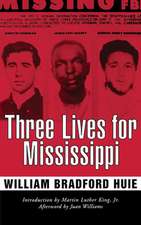Enough: The Phony Leaders, Dead-End Movements, and Culture of Failure That Are Undermining Black America--And What We Can Do a
Autor Juan Williamsen Limba Engleză Paperback – 30 iun 2007
In Enough, Juan Williams issues a lucid, impassioned clarion call to do the right thing now, before we travel so far off the glorious path set by generations of civil rights heroes that there can be no more reaching back to offer a hand and rescue those being left behind.
Inspired by Bill Cosby’s now famous speech at the NAACP gala celebrating the fiftieth anniversary of the Brown decision integrating schools, Williams makes the case that while there is still racism, it is way past time for black Americans to open their eyes to the “culture of failure” that exists within their community. He raises the banner of proud black traditional values—self-help, strong families, and belief in God—that sustained black people through generations of oppression and flowered in the exhilarating promise of the modern civil rights movement. Williams asks what happened to keeping our eyes on the prize by proving the case for equality with black excellence and achievement.
He takes particular aim at prominent black leaders—from Al Sharpton to Jesse Jackson to Marion Barry. Williams exposes the call for reparations as an act of futility, a detour into self-pity; he condemns the “Stop Snitching” campaign as nothing more than a surrender to criminals; and he decries the glorification of materialism, misogyny, and murder as a corruption of a rich black culture, a tragic turn into pornographic excess that is hurting young black minds, especially among the poor.
Reinforcing his incisive observations with solid research and alarming statistical data, Williams offers a concrete plan for overcoming the obstacles that now stand in the way of African Americans’ full participation in the nation’s freedom and prosperity. Certain to be widely discussed and vehemently debated, Enough is a bold, perceptive, solution-based look at African American life, culture, and politics today.
From the Hardcover edition.
Preț: 105.41 lei
Nou
Puncte Express: 158
Preț estimativ în valută:
20.17€ • 21.90$ • 16.94£
20.17€ • 21.90$ • 16.94£
Carte disponibilă
Livrare economică 01-15 aprilie
Preluare comenzi: 021 569.72.76
Specificații
ISBN-13: 9780307338242
ISBN-10: 030733824X
Pagini: 243
Dimensiuni: 134 x 202 x 14 mm
Greutate: 0.2 kg
Editura: Three Rivers Press (CA)
ISBN-10: 030733824X
Pagini: 243
Dimensiuni: 134 x 202 x 14 mm
Greutate: 0.2 kg
Editura: Three Rivers Press (CA)
Notă biografică
Juan Williams is a senior correspondent for NPR®. He is also a political analyst for the Fox News Channel and a panelist on Fox News Sunday. He is the author of Thurgood Marshall: American Revolutionary and Eyes on the Prize: America's Civil Rights Years, 1954-1965, among other books. During his twenty-one year career at The Washington Post, Williams served as an editorial writer, op-ed columnist, and White House correspondent. He lives in Washington, D.C.
From the Hardcover edition.
From the Hardcover edition.
Recenzii
Advance Praise for Enough
“Written in the tradition of DuBois and King, Enough is an impressively powerful and courageous book. Williams delivers a blunt and bracing challenge to black America.” —David J. Garrow, author of the Pulitzer Prize–winning Bearing the Cross and Senior Fellow at Cambridge University
“A courageous and much-needed primer on race relations in America today.” —Thomas Sowell, author of Black Rednecks and White Liberals and Senior Fellow at the Hoover Institution
“Enough is a breath of fresh air and a long overdue, critical insight into today’s stereotypical nonsense that has unfortunately been passing as the new black culture.” —Donna Brazile, political commentator for CNN and former campaign manager for Al Gore in 2000
“Juan Williams has, through Bill Cosby, spoken for the quiet majority of African Americans who desperately look for some voice to articulate what they know is truth. . . . I highly recommend Enough to those who are really interested in knowing our nation’s history, and specifically the odyssey of African Americans in this country.” —Douglas Wilder, mayor of Richmond, Virginia, and former governor of Virginia
“Juan Williams isn’t afraid to give Cosby his props, showing us that a lot of what people call black conservatism is plain common sense.” —John McWhorter, author of Winning the Race: Beyond the Crisis in Black America
From the Hardcover edition.
“Written in the tradition of DuBois and King, Enough is an impressively powerful and courageous book. Williams delivers a blunt and bracing challenge to black America.” —David J. Garrow, author of the Pulitzer Prize–winning Bearing the Cross and Senior Fellow at Cambridge University
“A courageous and much-needed primer on race relations in America today.” —Thomas Sowell, author of Black Rednecks and White Liberals and Senior Fellow at the Hoover Institution
“Enough is a breath of fresh air and a long overdue, critical insight into today’s stereotypical nonsense that has unfortunately been passing as the new black culture.” —Donna Brazile, political commentator for CNN and former campaign manager for Al Gore in 2000
“Juan Williams has, through Bill Cosby, spoken for the quiet majority of African Americans who desperately look for some voice to articulate what they know is truth. . . . I highly recommend Enough to those who are really interested in knowing our nation’s history, and specifically the odyssey of African Americans in this country.” —Douglas Wilder, mayor of Richmond, Virginia, and former governor of Virginia
“Juan Williams isn’t afraid to give Cosby his props, showing us that a lot of what people call black conservatism is plain common sense.” —John McWhorter, author of Winning the Race: Beyond the Crisis in Black America
From the Hardcover edition.
Extras
1
THE LEADERSHIP GAP
The stinging dart at the center of this controversy targets new black leadership.
Critics often charge Bill Cosby, in his Brown anniversary speech, with beating up on an easy mark: poor black people. Wrong. The critics are the ones who veer off target. Cosby repeatedly aimed his fire at the leaders of today's popular black culture, which is often not just created by black artists, but marketed and managed by black executives. He was talking about current black political leaders and, most of all, about the civil rights leaders who time and time again send the wrong message to poor black people desperately in need of direction as they try to find their way in a society where being black and poor remains a unique burden to bear.
Cosby's point is that lost, poor black people have suffered most from not having strong leaders. His charge is that these leaders--cultural and political--misinform, mismanage, and miseducate by refusing to articulate established truths about what it takes to get ahead: strong families, education, and hard work. Every American has reason to ask about the seeming absence of strong black leadership. Where is strong black leadership to speak hard truth to those looking for direction? Where are the black leaders who will make it plain and say it loud? Who will tell you that if you want to get a job you have to stay in school and spend more money on education than on disposable consumer goods? Where are the black leaders who are willing to stand tall and say that any black man who wants to be a success has to speak proper English? Isn't that obvious? It would be a bonus if anyone dared to say to teenagers hungering for authentic black identity that dressing like a convict, whose pants are hanging off his ass because the jail prison guards took away his belt, is not the way to rise up and be a success.
There's a reason it takes strong leadership to make these points. It takes a leader to articulate why success in a world that so dramatically devalues black people is a worthwhile goal. When young people--and older people--take on a spirit of rebellion in their clothes, language, music, and other forms of expression, they're only responding in a fairly rational way to a society that has first insulted and degraded them. It takes a real leader to look beyond the immediate emotional satisfaction--and even the academic justification--of throwing up a middle finger in the face of the oppressor, and see the bigger picture. It takes a leader to think through the consequences and outline a better path--even if it requires sacrifice in the short term, sacrifice that may include giving up the easy emotional satisfaction of ultimately pointless acts, unexamined gestures of rebellion that never rise to the level of true resistance or long-term revolution. But that kind of leadership is sorely lacking.
Why have black leaders spent the last twenty years talking about reparations for slavery as if it were a realistic goal deserving of time and attention from black people? Why is rhetoric from our current core of civil rights leaders fixated on white racism instead of on the growing power of black Americans, now at an astounding level by any historical measure, to determine their own destiny? Fifty years after Brown, much of the power to address the problems facing black people is in black hands. Here is Cosby at the very start of his famous speech:
"I heard a prizefight manager say to his fellow, who was losing badly, 'David, listen to me, it's not what he's doing to you. It's what you're not doing.'"
Black Americans, including the poor, spend a lot of time talking about the same self-defeating behaviors that are holding back too many black people. This is no secret. It's practically a joke. And black people are the first to shake their heads at the scandals and antics of the current crop of civil rights leaders who are busy with old-school appeals for handouts instead of making maximum use of the power black people have in this generation to determine their own success.
So how did we end up in this situation? Black leaders have always risen to the occasion in the past, and in far more desperate situations--why does the talent bench seem so thin today? One key here is that nearly forty years after Reverend King's death, the best black talent don't have civil rights leadership as their chief ambition. Strong black intellects and personalities are leaders in media (Richard Parsons, the head of Time Warner, and Mark Whitaker, editor of Newsweek), securities firms (such as Stanley O'Neal of Merrill Lynch), global corporations (Kenneth Chenault of American Express, Ann Fudge of the public relations firm Young and Rubicam), academic institutions (Ruth Simmons, Kurt Schmoke, Henry Louis Gates, Ben Carson), religious organizations (Floyd Flake, T. D. Jakes), and national politics (Eleanor Holmes Norton, Artur Davis, Barack Obama, and Colin Powell). That leaves the civil rights leadership of today in older hands: the Jesse Jacksons and Julian Bonds, people who made a name for themselves in the 1960s. And they are still fighting the battles of the 1960s. Then there are the latecomers, such as Al Sharpton, whose contribution is to mimic the aging leaders. Neither the old-timers nor their pale imitators recognize that national politics has changed and black people have changed. Hell, white people, as well as Hispanics, Asians, and other immigrants, have changed. Yet the black leadership is fighting the old battles and sending the same signals even as poor black people are stuck in a rut and falling further behind in a global economy.
Note that Cosby never identified himself as a civil rights leader. As he later put it, he is not Martin Luther King Jr. Cosby is a legendary figure in America's entertainment industry. He is at the top of his field. In speaking out, he presents himself as an ordinary man with a deep passion for the well-being of his people, black people. He is full of the rage of an average man who sees vulnerable people being hurt and feels compelled to speak out about the glaring errors and lack of truth-telling in dealing with their problems.
"I am not Jesus carrying a cross down the street," he told a reporter less than a month after the speech set fire to the controversy. "I gave the message and I may speak again and again. They want someone to do the work for them. I am not Dr. King. I am not a leader." But Cosby, like everybody else who is paying attention, recognizes bad leadership when he sees it.
One of Cosby's sharpest darts thrown at the current civil rights leaders hit home a few months after his Constitution Hall speech. He was at a town-hall meeting in Detroit to speak directly to black Americans in one of the nation's blackest cities. He wanted ordinary black people to hear from him directly about his comments at the Brown anniversary gala. When he reflected on today's black civil rights leaders, Cosby essentially asked, Why are black leaders making the case for black crack addicts to get softer sentences? Why are black leaders so concerned that cocaine users get shorter sentences than crack smokers? Let's look at the logic. It is true that the people snorting cocaine are more often white and middle-class, and crack addicts are disproportionately black and lower-class. You can make the case for a racial disparity in sentencing. But what if all this effort from black leaders was successful and crack addicts got lower sentences?
"Hooray," Cosby said, spitting it out bitterly. "Anybody see any sense in this? Systemic racism, they [black leaders] call it." Then Cosby pointed out the obvious issue--but one that the black civil rights leadership somehow missed or for some reason underplayed. Black leaders, he declared, should tell poor black people to stop smoking crack. They ought to demonize anybody who does it. They should say it is a betrayal of all the black people who fought to be free, independent, and in control of their own lives since the day the first slave ship landed. They should identify the crack trade as one of the primary reasons why so many young black people are ending up in jail. Certainly, back leaders should be in front of marches pushing those crack dealers out of black neighborhoods. And that effort should include a message that has yet to be heard with sincerity from black leaders: using crack, heroin, or any other addictive drug, including excessive drinking of alcohol, is self-destructive, breaks up families, saps ambition, and is more dangerous than most white racists.
But when was the last time you heard any civil rights leader raging against the clear evil of crack dealers, shaming them to stop selling crack? Has anyone seen the civil rights leaders at the head of a march against bad schools or a boycott against the minstrel acts and sex, beer, and gangster images that are promoted as authentic black identity on Black Entertainment Television? Essence, a black women's magazine, has taken the lead in condemning hateful verbal attacks on black women by black rap musicians. But the most visible black leadership is silent.
The good news about black leadership in America is that it has a history of inspirational success. Working against tremendous odds, black leaders have organized, built coalitions, and trained and inspired people of all colors to break through racism, taboos, and stereotypes to create the greatest social movement in American history--the twentieth-century civil rights movement.
That movement offers examples and tools of consistently innovative leadership that have left America's political, corporate, and cultural leaders hurrying to catch up. Movements for the rights of women, Hispanics, children, and gays have all credited the historical civil rights movement with opening doors for them, and have made the black rights movement the model for achieving their own aspirations.
And that history of strong leadership offers an example of what is possible for people who want to offer sincere, progressive leadership to black America today. Civil rights leaders have a fabulous record of progress, excellence, and achievement, and a willingness to fight and sacrifice for the next generation. Their commitment to democracy, law, and equality has made the civil rights movement the moral center of America for the past century.
Even black leaders who lost battles along the way became legends by setting out a clear path of courageous struggle. Failure wasn't desired, of course, but was willingly risked in the name of standing up for what was right. From the start of slavery in the United States, black leaders devised escapes, sabotaged plantation operations, and plotted strategic acts of violence to defy the system of human ruination that is slavery. Denmark Vesey led a slave revolt in 1822, in which he organized about 10,000 black people in both rural and urban areas around Charleston, South Carolina. At a time when black people outnumbered whites in the region, Vesey used black servants to spy on whites. He obtained and stored weapons, devised signals for his leaders to communicate, and had a clear plan for seizing the large arsenal in Charleston's harbor and using it to command the region. He recognized the power of religion and religious leaders in the black community, and used the church as a strategic center to identify leaders as well as recruit followers and hold meetings.
Ultimately the plot was uncovered and Vesey was hanged. But he ably demonstrated to black and white people the power of black people to throw off their identity as slaves and take on the mantle of self-determination as smart, courageous people in search of freedom. Less than ten years later, Nat Turner led a slave revolt of similar inspiration. These men were in a desperate situation, but these were not symbolic acts of self-destruction--they were organized resistance to an untenable status quo, and even in failure they inspired others to keep fighting and resisting.
Examples of the power of black leadership are evident in American history as early as 1780, when black leaders formed political groups to advance the right of black people to self-determination. The African Union Society of Newport for the Moral Improvement of Free Africans set requirements for the personal conduct of members who paid monthly dues for disability benefits and to be assured of proper burial. But the Union was also a political organization. It gave black people a voice in the city's political affairs with the goal of protecting equal rights for black people. The prize of black leadership, from that start, was always to have black people control their destiny by being able to educate their children, operate businesses, participate in politics as equals, and in the earliest struggle of all, live free of the exploitation of slave masters.
A streak of self-determination rises at every turn in the history of black American leadership. But since the stunning success of the modern civil rights movement--the steady rise since the Brown decision in the number of college-educated black people, as well as the concurrent growth in incomes, home ownership, and black elected officials--the strong focus on self-determination has faded, at the moment when its impact could have been the most powerful. In its place is a tired rant by civil rights leaders about the power of white people--what white people have done wrong, what white people didn't do, and what white people should do. This rant puts black people in the role of hapless victims waiting for only one thing--white guilt to bail them out.
The roots of this blacks-as-beggars approach from black leaders are planted in an old debate that is now too often distorted.
The most prominent voice for black liberation before the Civil War belonged to Frederick Douglass, a former slave who secretly taught himself how to read, then became a skilled worker in Baltimore's shipyards, before escaping to the freedom of the North. As a speaker, as the author of a book about his life in slavery, and as editor of a newspaper, the North Star, Douglass led the charge for all good people to stand against the abomination of slavery, including a call for black people to take up their own fight as a capable, strong force in American life. Douglass was the main black leader who pressed President Lincoln to allow black people to fight with the Union forces in the name of freeing themselves from slavery. All he asked of President Lincoln was that he officially emancipate the slaves so they could legally fight for their freedom. He personally recruited blacks, including his own two sons, for two regiments in Massachusetts. He asked the president for a military commission so he could lead black people in the fight for their own freedom.
From the Hardcover edition.
THE LEADERSHIP GAP
The stinging dart at the center of this controversy targets new black leadership.
Critics often charge Bill Cosby, in his Brown anniversary speech, with beating up on an easy mark: poor black people. Wrong. The critics are the ones who veer off target. Cosby repeatedly aimed his fire at the leaders of today's popular black culture, which is often not just created by black artists, but marketed and managed by black executives. He was talking about current black political leaders and, most of all, about the civil rights leaders who time and time again send the wrong message to poor black people desperately in need of direction as they try to find their way in a society where being black and poor remains a unique burden to bear.
Cosby's point is that lost, poor black people have suffered most from not having strong leaders. His charge is that these leaders--cultural and political--misinform, mismanage, and miseducate by refusing to articulate established truths about what it takes to get ahead: strong families, education, and hard work. Every American has reason to ask about the seeming absence of strong black leadership. Where is strong black leadership to speak hard truth to those looking for direction? Where are the black leaders who will make it plain and say it loud? Who will tell you that if you want to get a job you have to stay in school and spend more money on education than on disposable consumer goods? Where are the black leaders who are willing to stand tall and say that any black man who wants to be a success has to speak proper English? Isn't that obvious? It would be a bonus if anyone dared to say to teenagers hungering for authentic black identity that dressing like a convict, whose pants are hanging off his ass because the jail prison guards took away his belt, is not the way to rise up and be a success.
There's a reason it takes strong leadership to make these points. It takes a leader to articulate why success in a world that so dramatically devalues black people is a worthwhile goal. When young people--and older people--take on a spirit of rebellion in their clothes, language, music, and other forms of expression, they're only responding in a fairly rational way to a society that has first insulted and degraded them. It takes a real leader to look beyond the immediate emotional satisfaction--and even the academic justification--of throwing up a middle finger in the face of the oppressor, and see the bigger picture. It takes a leader to think through the consequences and outline a better path--even if it requires sacrifice in the short term, sacrifice that may include giving up the easy emotional satisfaction of ultimately pointless acts, unexamined gestures of rebellion that never rise to the level of true resistance or long-term revolution. But that kind of leadership is sorely lacking.
Why have black leaders spent the last twenty years talking about reparations for slavery as if it were a realistic goal deserving of time and attention from black people? Why is rhetoric from our current core of civil rights leaders fixated on white racism instead of on the growing power of black Americans, now at an astounding level by any historical measure, to determine their own destiny? Fifty years after Brown, much of the power to address the problems facing black people is in black hands. Here is Cosby at the very start of his famous speech:
"I heard a prizefight manager say to his fellow, who was losing badly, 'David, listen to me, it's not what he's doing to you. It's what you're not doing.'"
Black Americans, including the poor, spend a lot of time talking about the same self-defeating behaviors that are holding back too many black people. This is no secret. It's practically a joke. And black people are the first to shake their heads at the scandals and antics of the current crop of civil rights leaders who are busy with old-school appeals for handouts instead of making maximum use of the power black people have in this generation to determine their own success.
So how did we end up in this situation? Black leaders have always risen to the occasion in the past, and in far more desperate situations--why does the talent bench seem so thin today? One key here is that nearly forty years after Reverend King's death, the best black talent don't have civil rights leadership as their chief ambition. Strong black intellects and personalities are leaders in media (Richard Parsons, the head of Time Warner, and Mark Whitaker, editor of Newsweek), securities firms (such as Stanley O'Neal of Merrill Lynch), global corporations (Kenneth Chenault of American Express, Ann Fudge of the public relations firm Young and Rubicam), academic institutions (Ruth Simmons, Kurt Schmoke, Henry Louis Gates, Ben Carson), religious organizations (Floyd Flake, T. D. Jakes), and national politics (Eleanor Holmes Norton, Artur Davis, Barack Obama, and Colin Powell). That leaves the civil rights leadership of today in older hands: the Jesse Jacksons and Julian Bonds, people who made a name for themselves in the 1960s. And they are still fighting the battles of the 1960s. Then there are the latecomers, such as Al Sharpton, whose contribution is to mimic the aging leaders. Neither the old-timers nor their pale imitators recognize that national politics has changed and black people have changed. Hell, white people, as well as Hispanics, Asians, and other immigrants, have changed. Yet the black leadership is fighting the old battles and sending the same signals even as poor black people are stuck in a rut and falling further behind in a global economy.
Note that Cosby never identified himself as a civil rights leader. As he later put it, he is not Martin Luther King Jr. Cosby is a legendary figure in America's entertainment industry. He is at the top of his field. In speaking out, he presents himself as an ordinary man with a deep passion for the well-being of his people, black people. He is full of the rage of an average man who sees vulnerable people being hurt and feels compelled to speak out about the glaring errors and lack of truth-telling in dealing with their problems.
"I am not Jesus carrying a cross down the street," he told a reporter less than a month after the speech set fire to the controversy. "I gave the message and I may speak again and again. They want someone to do the work for them. I am not Dr. King. I am not a leader." But Cosby, like everybody else who is paying attention, recognizes bad leadership when he sees it.
One of Cosby's sharpest darts thrown at the current civil rights leaders hit home a few months after his Constitution Hall speech. He was at a town-hall meeting in Detroit to speak directly to black Americans in one of the nation's blackest cities. He wanted ordinary black people to hear from him directly about his comments at the Brown anniversary gala. When he reflected on today's black civil rights leaders, Cosby essentially asked, Why are black leaders making the case for black crack addicts to get softer sentences? Why are black leaders so concerned that cocaine users get shorter sentences than crack smokers? Let's look at the logic. It is true that the people snorting cocaine are more often white and middle-class, and crack addicts are disproportionately black and lower-class. You can make the case for a racial disparity in sentencing. But what if all this effort from black leaders was successful and crack addicts got lower sentences?
"Hooray," Cosby said, spitting it out bitterly. "Anybody see any sense in this? Systemic racism, they [black leaders] call it." Then Cosby pointed out the obvious issue--but one that the black civil rights leadership somehow missed or for some reason underplayed. Black leaders, he declared, should tell poor black people to stop smoking crack. They ought to demonize anybody who does it. They should say it is a betrayal of all the black people who fought to be free, independent, and in control of their own lives since the day the first slave ship landed. They should identify the crack trade as one of the primary reasons why so many young black people are ending up in jail. Certainly, back leaders should be in front of marches pushing those crack dealers out of black neighborhoods. And that effort should include a message that has yet to be heard with sincerity from black leaders: using crack, heroin, or any other addictive drug, including excessive drinking of alcohol, is self-destructive, breaks up families, saps ambition, and is more dangerous than most white racists.
But when was the last time you heard any civil rights leader raging against the clear evil of crack dealers, shaming them to stop selling crack? Has anyone seen the civil rights leaders at the head of a march against bad schools or a boycott against the minstrel acts and sex, beer, and gangster images that are promoted as authentic black identity on Black Entertainment Television? Essence, a black women's magazine, has taken the lead in condemning hateful verbal attacks on black women by black rap musicians. But the most visible black leadership is silent.
The good news about black leadership in America is that it has a history of inspirational success. Working against tremendous odds, black leaders have organized, built coalitions, and trained and inspired people of all colors to break through racism, taboos, and stereotypes to create the greatest social movement in American history--the twentieth-century civil rights movement.
That movement offers examples and tools of consistently innovative leadership that have left America's political, corporate, and cultural leaders hurrying to catch up. Movements for the rights of women, Hispanics, children, and gays have all credited the historical civil rights movement with opening doors for them, and have made the black rights movement the model for achieving their own aspirations.
And that history of strong leadership offers an example of what is possible for people who want to offer sincere, progressive leadership to black America today. Civil rights leaders have a fabulous record of progress, excellence, and achievement, and a willingness to fight and sacrifice for the next generation. Their commitment to democracy, law, and equality has made the civil rights movement the moral center of America for the past century.
Even black leaders who lost battles along the way became legends by setting out a clear path of courageous struggle. Failure wasn't desired, of course, but was willingly risked in the name of standing up for what was right. From the start of slavery in the United States, black leaders devised escapes, sabotaged plantation operations, and plotted strategic acts of violence to defy the system of human ruination that is slavery. Denmark Vesey led a slave revolt in 1822, in which he organized about 10,000 black people in both rural and urban areas around Charleston, South Carolina. At a time when black people outnumbered whites in the region, Vesey used black servants to spy on whites. He obtained and stored weapons, devised signals for his leaders to communicate, and had a clear plan for seizing the large arsenal in Charleston's harbor and using it to command the region. He recognized the power of religion and religious leaders in the black community, and used the church as a strategic center to identify leaders as well as recruit followers and hold meetings.
Ultimately the plot was uncovered and Vesey was hanged. But he ably demonstrated to black and white people the power of black people to throw off their identity as slaves and take on the mantle of self-determination as smart, courageous people in search of freedom. Less than ten years later, Nat Turner led a slave revolt of similar inspiration. These men were in a desperate situation, but these were not symbolic acts of self-destruction--they were organized resistance to an untenable status quo, and even in failure they inspired others to keep fighting and resisting.
Examples of the power of black leadership are evident in American history as early as 1780, when black leaders formed political groups to advance the right of black people to self-determination. The African Union Society of Newport for the Moral Improvement of Free Africans set requirements for the personal conduct of members who paid monthly dues for disability benefits and to be assured of proper burial. But the Union was also a political organization. It gave black people a voice in the city's political affairs with the goal of protecting equal rights for black people. The prize of black leadership, from that start, was always to have black people control their destiny by being able to educate their children, operate businesses, participate in politics as equals, and in the earliest struggle of all, live free of the exploitation of slave masters.
A streak of self-determination rises at every turn in the history of black American leadership. But since the stunning success of the modern civil rights movement--the steady rise since the Brown decision in the number of college-educated black people, as well as the concurrent growth in incomes, home ownership, and black elected officials--the strong focus on self-determination has faded, at the moment when its impact could have been the most powerful. In its place is a tired rant by civil rights leaders about the power of white people--what white people have done wrong, what white people didn't do, and what white people should do. This rant puts black people in the role of hapless victims waiting for only one thing--white guilt to bail them out.
The roots of this blacks-as-beggars approach from black leaders are planted in an old debate that is now too often distorted.
The most prominent voice for black liberation before the Civil War belonged to Frederick Douglass, a former slave who secretly taught himself how to read, then became a skilled worker in Baltimore's shipyards, before escaping to the freedom of the North. As a speaker, as the author of a book about his life in slavery, and as editor of a newspaper, the North Star, Douglass led the charge for all good people to stand against the abomination of slavery, including a call for black people to take up their own fight as a capable, strong force in American life. Douglass was the main black leader who pressed President Lincoln to allow black people to fight with the Union forces in the name of freeing themselves from slavery. All he asked of President Lincoln was that he officially emancipate the slaves so they could legally fight for their freedom. He personally recruited blacks, including his own two sons, for two regiments in Massachusetts. He asked the president for a military commission so he could lead black people in the fight for their own freedom.
From the Hardcover edition.
Descriere
One of the country's best known and most respected black journalists attacks the failure of the post-Civil Rights generation of African Americans to seize on the gains of that historic movement.

